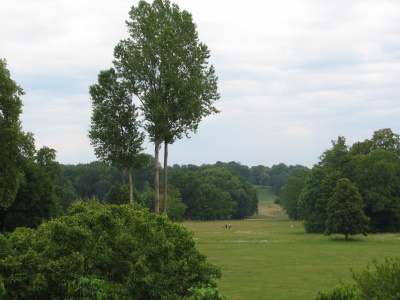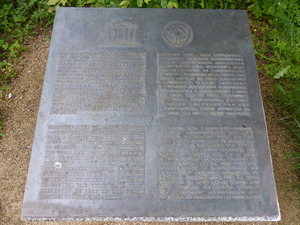Muskauer Park

Muskauer Park / Park Mużakowski is a 19th-century landscape park that has been influential in landscape architecture.
The founder of the park was Prince Hermann von Pückler-Muskau, who developed the park initially on the grounds of its estate and then extended it to reach the town of Bad Muskau. He incorporated human-made architectural elements into a network of vistas along with natural components.
Community Perspective: The park now lies on both sides of the German/Polish border at the river Neisse in a fairly remote location. It requires a lot of walking to see it all, so it’s better to rent a bike. The buildings (Old and New Castle) are not that impressive. Pückler was a very avid early traveller, and he even has his own connection!


Map of Muskauer Park
Load mapCommunity Reviews
Ian Cade

We had a somewhat unplanned, quick, cold but still pleasant trip here in January 2016.
Having driven around town trying to find the central palace and missing it a few times, we eventually found a space right in the centre of town. Putting on as many layers as possible we ventured out and were surprised that the palace was architecturally more interesting than we had anticipated, and the frozen moat certainly looked nice in the clear winter sun. Not really being in the mood to explore the interior we instead made a beeline for the Polish border. A swift trip over the River Neisse led to a game of scissors, paper, stone to see who would take off their gloves for a commemorative photo of our international stroll. Two minutes later my gloves were back on and we were heading for a cafe to warm up.
That really was the extent of our visit. It was fun but we were only paying lip service to it being a site of Outstanding Universal Value. Whilst it may well be the least substantial WHS visit I've ever had it probably also qualifies as the coldest.
Site 2: Experience 4
Michael Turtle

Muskauer Park straddles the border of Germany and Poland with large parts of the garden in both countries. It’s a testament to cross-country cooperation that there is a smooth synergy between both sides and, if it wasn’t for the river as the border, it would be hard to know where one ends and the other starts.
I approached it from the German side, which has the main buildings in it. As you cross the river, signs on each side have the colours of Germany or Poland. It takes me several hours to walk around the route that I’ve chosen – and there’s still a lot more I could have seen.
The park is large and it would probably take all day to properly walk through it all. Bicycle is an excellent way to explore the furthest parts or a horse-drawn carriage is a more luxurious option. It is, though, easy enough to explore enough by yourself to see a variety of areas in a morning or afternoon.
Read more from Michael Turtle here.
Clyde

I visited this WHS in May 2014. I drove through small villages before getting to Bad Muskau, a small town close to the border with Poland. To access the parking area near Muskauer Park, I unknowningly crossed the border to Poland but eventually I got there by following the signs showing the way to Park Muzakowski. The best way to enjoy the landscaped park is to rent a bicycle from the visitor centre and cycle to the New Castle crossing from one bridge to the next. On the Polish side I managed to spot a deer, a wild boar and quite a lot of passerine birds, herons, ducks and geese. The UNESCO plaque is close to the 295 bridge connecting Germany to Poland. The New Castle housing an exhibition on Puckler is worthwhile visiting and I ended my visit enjoying a nice hot chocolate at the castle cafe before driving back to Berlin.
Klaus Freisinger
Since a trip to the beautiful city of Dresden (which is definitely WH-worthy, despite the stupid bridge) didn't add anything to my WH count, I went by train and bus to the scenic small town of Bad Muskau. The Muskauer Park, created by the nobleman Fürst Pückler in the 19th century on both sides of the Neisse River, today straddles the German-Polish border, and that's really the most interesting aspect of it. Since both countries are now in the Schengen zone, there are no passport controls anymore, and it is fun to rent a bike at the visitor center in the palace, cross over into Poland, and go back again. The trouble about the whole park is that there are no signs whatsoever, so you better get a decent map first. The town and the park make for a pleasant day trip, and the scenery is very pretty, but the World Heritage value of the site is to me somewhat doubtful.
Els Slots

Prince Pückler himself once stated that his inherited estate was located in a half-desert, amidst forests and only surrounded by wolves, wild boars, farmers and stupid men. This region nowadays still has very much a frontier feel: rural, empty, with dark impenetrable forest. Place names are spelled in both German and Polish. During the Cold War this must have been a true eerie place. The ICOMOS evaluation stated that because of the isolated location ‘over-visiting seems unlikely’.
A brand new permanent exhibition on the life and ideas of the dandy and extravagant Prince is on show in the New Castle, the focal point of the park. This man was a very serious traveller: he had visited more sites that have become WHS than many of us now. He visited England often and ‘did’ an extensive Grand Tour around Europe and the Middle East. He travelled for a year in Egypt (even bought a slave girl there), arrived in Algiers (after missing the boat to the USA), was received by the Bey of Tunis and attended the wedding of Napoleon in Paris. He saw Blenheim, Schönbrunn, Naples, Athens, Damascus, the Pyramids. And all was used as inspiration for his work, but not without staying critical and developing his own vision.
Muskauer Park is Pückler’s major work as a garden designer (Babelsberg in Potsdam is another). About 40% of the park is located in Germany, and the rest in Poland. Bridges across the Neisse River connect both sides of the park. One can freely wander from the German side to the Polish side. The park is very large, too large to all explore on foot. It’s not dotted with ornaments – its strongest points definitely are the ‘natural’ open views. Very fine for walking and cycling. And don’t miss the museum in the New Castle where renovations just have finished.
Sazanami

This park may be an important place for modern park design,but when I've researched it before the registration in the WHL,I couldn't get informed at all exept location.
On my trip to the park I got the train through night to Zary from Katovice in Poland and transfered to the bus to the town on which the park located.
All buildings seem to be restored,but not impressive.Almost main architecture are in the German side.Its important thing isn't architecture,but gardens,which I recommend it all seasons.One of the best excursion site from Dresden if you're looking for some interest place.
Solivagant

On a trip to the area of “former GDR” a few years ago we were trying to cover all its Michelin 2 and 3 “*” sites (!) and, right on the Polish border, we came to the little spa town of Bad Muscau. Here, in the early 19th century ,a Prince Puckler had created a huge park (Michelin **). This park has had a chequered history – first bankrupting the prince, then being taken over by Prince Freidrich of the Netherlands who altered its style somewhat, then being destroyed in 1945 and split across 2 countries. When we were there in 2002 it was undergoing the latter stages of reconstruction.
It was with some surprise then that we noted its elevation as a joint German/Polish nomination to WHS status in 2004 (In 2002 we still didn’t use the Tentative List to inform our travels).
Apparently to Garden Historians the Park has huge significance. Indeed anyone interested in this aspect of “world culture” should note that there are 2 other WHS inscribed gardens within a few hours drive of Muskau – at Dessau-Wörlitz (late 18th century) and at Potsdam (Is this a bit of WHS “overkill” or is there something genuinely to be gained from having a continuity of styles inscribed?).
Even though (or perhaps because) the gardens were considerably influenced by English garden design theories I can’t say we were over-impressed. We only saw a part of the German side (less than half the area but perhaps containing the main buildings?) and the large landscape concepts need a lot of walking to appreciate. We personally preferred the gardens at Dessau-Wörlitz even though we saw them in very bad weather. The buildings (photo) were also still in need of renovation. Nevertheless the inscription represents an interesting strand of human culture. Worth a visit.
Christer Sundberg

Right by the German/Polish border and the river Neisse is the small town of Bad Muskau, a sleepy little spa town with 4000 souls that goes back to the 13th century. Bad Muskau’s claim to fame is the Fürst Pückler Park, also named Muskauer Park, the biggest and one of the most famous English-style parks in Germany and Poland, once founded by Prince Herman von Pückler-Muskau in the beginning of the 19th century.
The park was covers 3.5 sqm in Poland and 2.1 in Germany and extends on both sides of the river so if you want to visit the entire park you better have your passport ready when the local border guard turns up behind the bushes at one of the bridges.
The centre of the park is the two castles - the New and the Old - together with stables, orangeries, sanatoriums and a “kurhouse” with healthy mud-baths and even a private railroad. Prince Pückler vision was to design a park as a “painting with plants”, using local plants to enhance the qualities of the landscape and his dream have certainly come true. So if you feel for a “walk in the park”, Bad Muskau is the place to head for.
I can recommend to stay at Am Wasserturm, a nice little B&B just on the outskirts of Bad Muskau - brilliant food and a nice atmosphere and its own water tower on the back yard.
Community Rating
- : Jarek Pokrzywnicki George Gdanski Yevhen Ivanovych Rafał Kałczuga
- : Christoph
- : George Evangelou Juropa Cezar Grozavu
- : Wojciech Fedoruk Andreas Thum Craig Harder Thibault Magnien Philipp Peterer Manuelfunk Antonio J. WalGra Daniel Gabi
- : Awestix Hanming NonDuality Jan Zimmermann Ralf Regele Daniel C-Hazard Mohboh MH Martina Rúčková Ivan Rucek
- : Els Slots Echwel Randi Thomsen Stanislaw Warwas Nan Szucs Tamas Klaus Freisinger Philipp Leu Dorejd Gary Arndt Shandos Cleaver Peter Lööv MaxHeAnouBen Ljowers Caspar Dechmann
- : Svein Elias Walter Joyce van Soest Federico P. Zoë Sheng Luboang Clyde VLabhard Hubert Mikko Argo Simonh David Berlanda Adrian Turtschi Dirk-pieter
- : Solivagant Csaba Nováczky CugelVance Ian Cade Alexander Lehmann
- : Roman Raab
Site Info
- Full Name
- Muskauer Park/Park Muzakowski
- Unesco ID
- 1127
- Country
- Germany Poland
- Inscribed
- 2004
- Type
- Cultural
- Criteria
-
1 4
- Categories
- Cultural Landscape - Clearly defined Structure - Park or garden
- Link
- By ID
Site History
2004 Inscribed
Site Links
Unesco Website
Official Website
Related
In the News
Connections
The site has 14 connections
Art and Architecture
Damaged
Geography
Human Activity
Individual People
Timeline
Trivia
Visiting conditions
WHS Hotspots
WHS on Other Lists
World Heritage Process
Visitors
190 Community Members have visited.
The Plaque
 (photo by Clyde)
(photo by Clyde) (photo by Clyde)
(photo by Clyde)